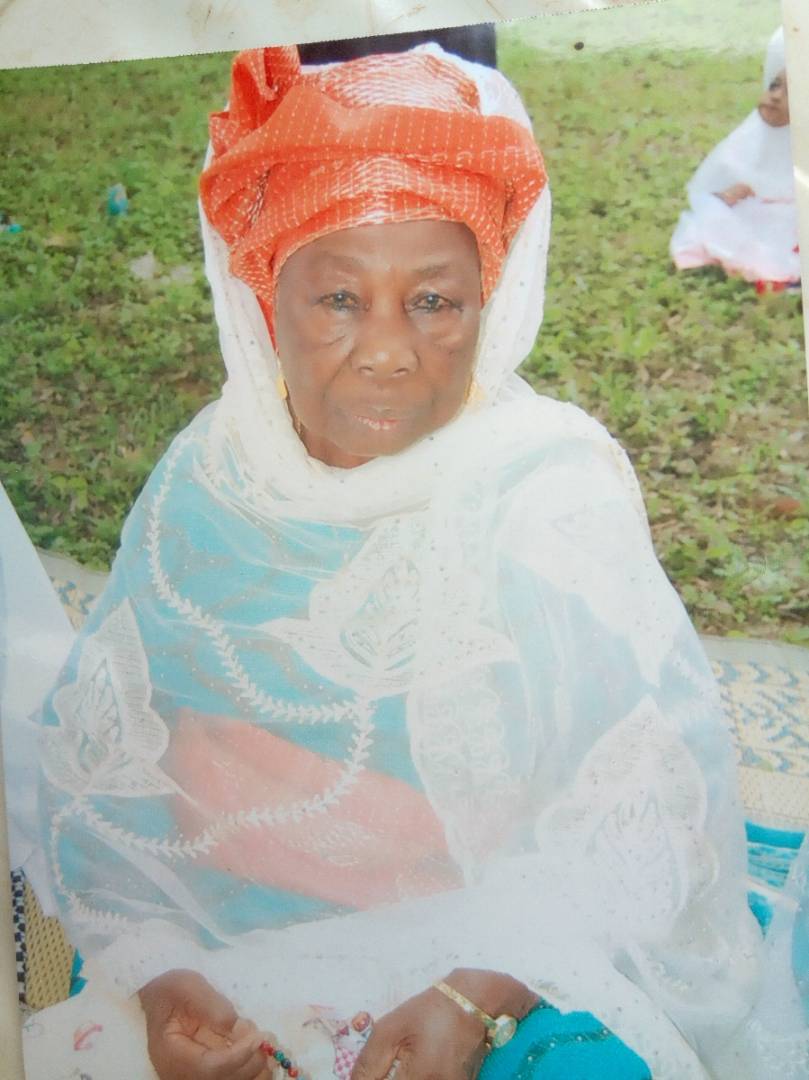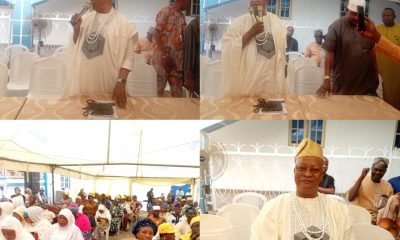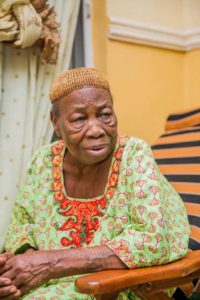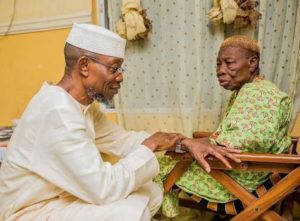News
What You Need To Know About Aregbesola’s Mother

ALHAJA SARATU ASABI AREGBESOLA (IYA OLOBI)
A true life of service to Allah SWT and humanity
Death came quietly in the morning of August 1, 2017 and took our mother, grandmother, and great-grandmother, Alhaja Saratu Asabi Aregbesola, aka Mama Olobi, to the great beyond in Aljana.
It was however a transition to glory.
Mama lived a full and exemplary life. She was a good woman by the Islamic, Yoruba culture and universal human standards. She was a good wife, a great mother, a deeply devoted Muslim and a philanthropist.
She was born in Ilesa in 1933 to Aduroja Balogun of the Balogun Family and Aishat Balogun from Owoso family, both of Ilesa.
She spent her early years in Ilesa before moving with one of her relations who was a trader to Ijebu in present Ogun State. She returned to Ilesa where she met her husband, Alhaji Rufai Aregbesola, from Ogbon Arogbo in Ilesa, and they got married on 1 October, 1951. The trajectory of her life eventually followed that of her husband’s from that golden moment.
As it is with every Ijesa indigene, whose provenance must be a remote countryside, Alhaji Rufai’s provenance was Irogbo village. He was a dashing young man who had learnt the modern vocational craft of carpentry and joinery. Then, it was a modern art form introduced by Europeans and returnee slaves from especially Brazil but was a wonder to the locals who lived mostly in mud and thatched houses.
By stroke of circumstances, Pa Rufai was engaged by the vicar of Saint John’s Anglican Church, Iloro, Ilesa for the carpentry and joinery work of a new cathedral being built. The cathedral remains an imposing architectural masterpiece till today.
However, after the completion of this building, the Anglican Church transferred the vicar to Ikare Akoko, in present Ondo State, in the northernmost part of Yorubaland. Being impressed with Pa Rufai’s work in Ilesa, he quickly invited him to be part of the new cathedral he was building again in Ikare.
Pa Rufai, now newly married, took his wife to Ikare to start on his new job. He completed this job, got others and eventually settled in this town, where he found accommodation.
God blessed his work and prospered him in Ikare where he had all his children, was able to build his own house, owned vehicles, trained all his children and lived a comfortable middle class life.
He returned to Ilesa later in life where he lived the rest of his life before his passage in May 1992.
It was the manifest destiny of Alhaja Saratu to embark on this journey of life with her husband. These were the circumstances that shaped her own life and cut her persona. It was in this course that she manifested her sterling qualities as wife, mother, Muslim and good citizen.
Mama was an astute trader who learnt how to trade from birth. It is often said that it in the DNA of every Ijesa to be enterprising. During her growing up years, it was the practice for Ijesas to travel to far and near places for trading; either to bring essential goods to their people or take needed goods and items to others to buy. They were also very shrewd business people.
The Ijesas would be quick to persuade a customer to buy on credit, usually textiles and household goods, and would wait until he or she wore the cloth or use the items before returning to importune the debtor for payment, which often involve embarrassing methods.
Mama was adept at this merchandising but eventually settled for cola nut, for which she became famous in Ijesaland and beyond. She not only mastered the trade, she became the leader of cola nut and other stimulants merchants.
Since her return to Ilesa with her husband, she had lived in the family house. The only occasion she had to seek refuge elsewhere was on account of her son, Rauf Aregbesola, who was contesting to be governor of the State of Osun in 2007. The politics of bitterness at the time blinded the party in power in the state at that time to basic rule of decency. When threats to her life could no longer be ignored, she relocated to Lagos after the governorship election of April, 2007 and could only return few months after her son became the governor in 2011.
Mama was blessed with five children – late Mrs Wosilat Oseni-Ishola, Rauf Adesoji Aregbesola, Amudat Adenike Oladeji, Bashiru Adediran Aregbesola and Sikiru Oladele Aregbesola – and many grandchildren and great grandchildren, who are all doing well in the paths they have chosen for themselves.
Alhaja Saratu was a devout Muslim. She had committed her life since her youth to the service and worship of Allah SWT and was fortunate to meet a husband who encouraged her along this line. She was a member of the Nawarudeen Islamic Society and remained there till her departure. After the demise of her husband in 1992, and her children who are grownups found their feet in life, she devoted herself to deeper commitment to Allah SWT in prayer, piety, philanthropy and Islamic charities, as her trade in cola nut took second place.
Mama left a remarkable legacy as a faithful wife, loving mother, community leader of no mean repute, leading kola nuts trader and a devout Muslim. She gave her very best to the service of Allah SWT in regular Asalatu as well as leadership of many Islamic charity organisations, kola nuts traders association and other women groups. Mama was kind-hearted and generous of spirit and of her substance. She freely gave of her fountain of wisdom. She was hard working and industrious.
Though we missed her, we are filled with joy that her vivacious spirit remains with us and she continues to live through us in the seeds of discipline, hard work and motherly love she had sown in us.
Adieu Iya Olobi! Sun re o.
May the soul of our mother find eternal rest with her creator in Aljannah Firdaus.
-

 News5 days ago
News5 days agoInsecurity: Kogi Schools Resume On Monday
-

 Opinion4 days ago
Opinion4 days agoDon’t Pull the Plug: Why Nigerians Are Pleading for the U.S. to Extend Its Police Training Program — and Why It Must Synergize With New Military Arrivals
-

 Crime4 days ago
Crime4 days agoVigilante Reportedly Shoots Colleague Dead In Plateau
-

 News2 days ago
News2 days agoRamadan: Osun Cleric Urges Compassion Among Muslims As Asejere Distributes Relief Materials To 537 Beneficiaries













